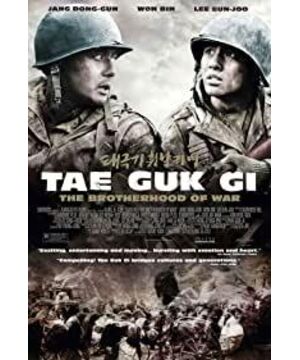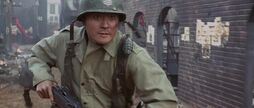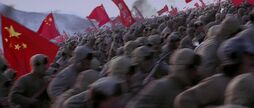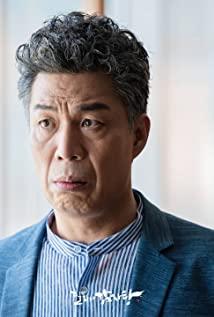However, I recently watched the most heavily invested film in South Korea's history, "Flying the Flag of Taiji", but it made me see a completely different Korean film and television from the past.
The grandness of the war scene even invited first-line stars such as Jang Dong Gun, Won Bin, and Lee Eun Joo to appear. I have to say that this is an unprecedented blockbuster in South Korea.
When it comes to blockbusters, many of them imitate Hollywood fast food. They just use a series of high-tech effects to support an empty shelf. After watching it once, you don’t want to watch it again. Hong Kong movies generally have little substance, while mainland movies Most of them are mainly based on imitation. Once war is involved, it has a very distinct ideology. If there is no image of a great man at the highest level, it is almost impossible. It's all too dogmatic for the audience. The only thing missing must be the humanized content that can attract the audience and bring them closer.
The touchingness of "The Tai Chi Flag Flying" is largely due to the human nature from beginning to end. Here, war is no longer the capital used to show off the great achievements of the leader, nor is it the beautification of the victor for himself, we can only see two words - cruelty.
The result of the Korean War was already very controversial. All the parties involved in the war claimed that they had won, but in fact, it was just an inconclusive result, just an incalculable death. War is always cruel and bloodshed is always an ordinary soldier! The leader sits in the rear to command, and the lives of the soldiers will always be insignificant pawns.
I have seen the domestic movies of resisting U.S. Aggression and Aid Korea, and without exception, they are all promoting the official ideology and revolutionary heroism. Of course, in a country that pays great attention to politics and the unity of thought, everyone is used to it, and the beliefs of these heroes are also It is for the sake of the motherland, the organization of the party, and the life and death of individuals are naturally nothing.
American war films are actually promoting one of their values, such as saving Private Ryan, but they have developed their concept of human rights to the extreme. What happened to Iraq after being kidnapped, I don't want to say more, it's really disgusting to deliberately promote their human rights supremacy.
And "The Taiji Flag Flying" is more real. Here, what we see is not only the war, but also the reflection on the war. The profound reflection on the ideological struggle at the beginning, there were people at the beginning of the first battle. It is proposed that "this war and fighting against the Japanese devils are two separate things", "soldiers are also human!", the bloody war scenes, human nature is constantly being strangled in the war, life is so fragile before the killing, every war is a war. After watching the nightmares, people don’t want to be more exciting, but hope that this cruel nightmare will end soon. During the battle, facing the compatriots and holding the bayonet, only one of the two can survive. Then continue to fight... Human wars have always been like this, and those battles that people are proud of are piled up under the bones!
In a war, it is difficult to say who is right and who is wrong. Both sides are fighting for their own beliefs and ideologies. In fact, what are they fighting for? Most of the time, what ordinary people report is just a simple idea. However, "Flag of Tai Chi" completely crossed this form. There is no justice and no evil, and the whole war is a disaster! In this disaster, the protagonist's belief has also become simple. Regardless of the country, the nation, or the ideology, all the elder brother can do is to get his younger brother out of this disaster as soon as possible. What is most touching is not the heroism, but the It seems like a simple but great family!
Zhenta loves his brother and takes care of the frail Zhenxi. For his brother, Zhenta fights bravely, just for a medal that can let his brother leave! In its eyes, his younger brother is his only hope, but Jin Suk uses another kind of love for his elder brother. He hopes that his elder brother can live and that the brothers can be together forever. Human conflict is inevitable. So in his eyes, his brother only thinks about medals, and what makes it even more difficult for him to accept is that his brother only thinks about him, and never for himself. Such a complex is enough to be deeply saddened by people who are bystanders. It is this kind of family love that supports the development of the whole story. It is moving, but not tedious. Humanity in the ordinary, greatness in the ordinary! Above all slogan-like rhetoric. Such feelings are enough to shock the world in such an era!
Of course, movies have no preference for war. In addition to being cruel, they are described in an objective way. North Korea's army is a bit ugly, but South Korea's is not great. No matter which side it is, in the war It's all abominable, and for every North Korean, it's a terrible disaster.
The indiscriminate killing of prisoners of war, especially in the post-war era of revolts, the film's unscrupulous description of the brutality of the South Korean secret service's massacre of innocent people is awe-inspiring. War has distorted all human nature, and only the friendship between brothers has a little function in this distorted turbid current. When his wife was killed and his younger brother was burned to death, Jinta's rationality was finally completely defeated. Instead, he turned to mad revenge and aimed the knife at the South Korean army he used to serve, without any position at all. , This kind of wickedness makes people feel so happy, because this is just simple human nature! Until the extinguished hope was rekindled, and when he realized that the enemy who was almost killed by him was actually his younger brother, the dead humanity finally awakened. For this affection, the older brother finally gave his life. There is no stand, no ideology, no heroism, no empty slogans, only the dignity of an individual life and the most basic human emotions, this is enough!
The film itself shows the great pain brought to the people by the brutal war and the unbreakable family and love. (especially the bromance) and it's the human touch in the film that brought me to tears more than once. The deaf mother watched her two children were taken to the front line to fight, but she was powerless; her brother would sacrifice his own life for the safety of his younger brother; she watched her fiancée die at her own hands, but could not help her; a friend Brothers turned against each other, and the war changed everything. But it is an inconclusive war, but such an ordinary family lost the most precious and beautiful things. I'm afraid this is what the film needs us to seriously think about.
The film uses flashbacks, starting with the elderly younger brother, because of a call to claim the remains of the battlefield during the Korean War, which reminds people of that thrilling war. At the end, it is from ancient times to the present. The posture of my brother lying on his side when he sacrificed has evolved from a black and white war picture to a reality of a color picture, and the brother's corpse, which was blackened by the fireworks of the war, also turned into a pile of bones. Only the pen that the elder brother gave to the younger brother is still lying there intact, telling the unbearable history of these fifty years and the sorrow that makes people shake their heads.
I am afraid, this is the best war film, let people understand what is human nature, rather than let people see the grandness of the war scene and feel the visual enjoyment.
After watching the film, I was truly shocked by the greatness of human nature. It was no longer just the Tai Chi flag, but a human flag that never fell.
View more about Tae Guk Gi: The Brotherhood of War reviews









